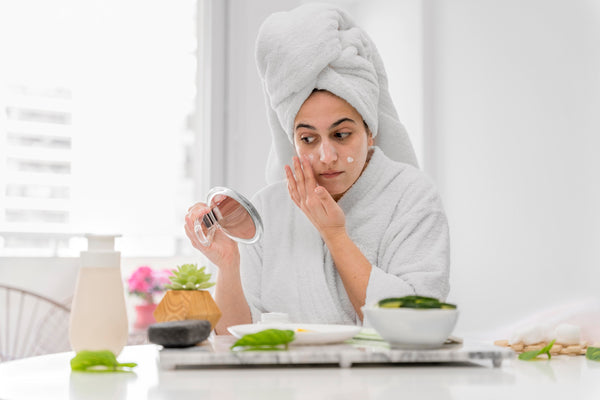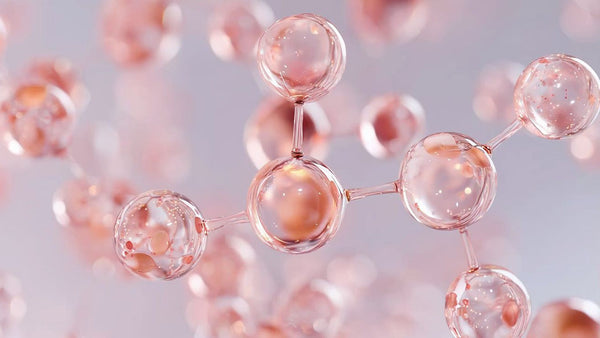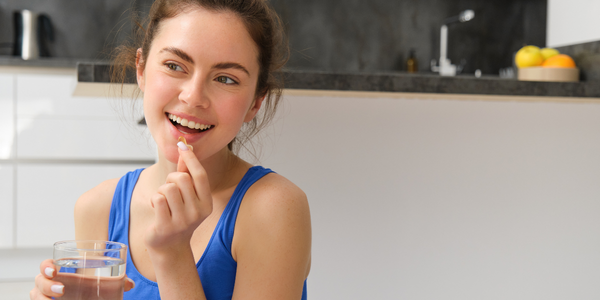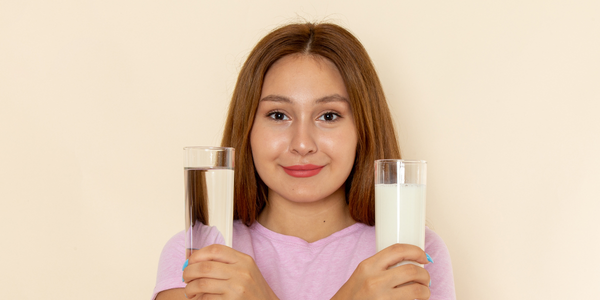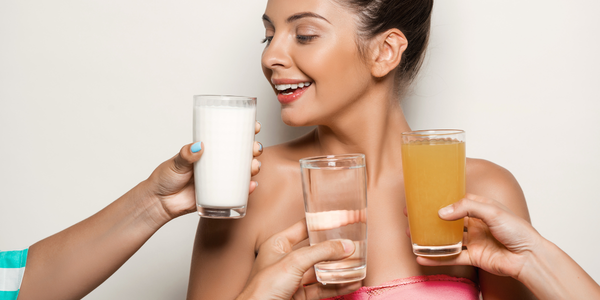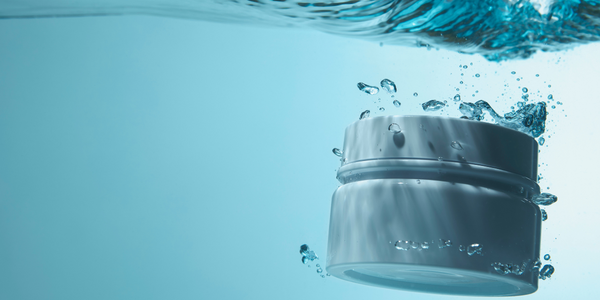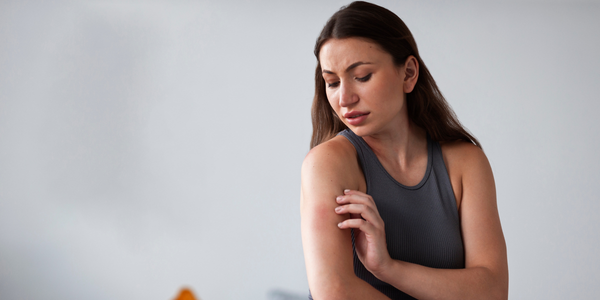Acne is a common skin condition which arises when your skin pores are blocked with oil(sebum),bacteria and dead skin cells. It has a prevalence of 85% and occurs during adolescence mostly. It affects both men and women alike and is quite irritating and even painful at times. However, with the right tips at your disposal, you can reduce or completely prevent acne.
Want to know what those tips are?
Read along. This blog talks about 6 amazing tips to reduce acne and uplift overall skin health. And by the end, you’ll have a complete defense system against acne.
What Causes Acne?
An acne breakout is triggered specifically because of androgen, a hormone known to stimulate sebum production. However, that's not the only reason behind acne on your face. Acne can also be caused due to:
-
Genetics
-
Diet
-
Puberty
-
Hormonal Issues
-
Pregnancy
-
High humidity
-
Squeezing Existing Pimples
-
Rubbing your Skin Harshly
-
Some Medications
Are Acne and Pimple the Same?
While most people use the terms pimple and acne interchangeably, they aren't the same. Acne is a skin condition clogging or blocking your hair follicles and glands whereas pimples are a symptom of acne. Pimple are like small growths on the surface of the skin mainly on the face, neck, chest and upper back. Other symptoms of acne include:
-
Cysts
-
Pustules
-
Papules
-
Whiteheads
-
Blackheads
-
Nodules
How can you Prevent or Reduce Acne Spots?
1. Keep a check on your Diet
Your diet impacts almost every aspect of your body. And skin conditions such as acne are no exception.
Research says that western-style foods such as burgers, milkshakes, nuggets, etc, have a higher glycemic index, are rich in omega-6 fatty acids, refined carbs, fats, and calories and can aggravate the risk of increasing acne.
Therefore, opt for a nutrient-rich diet incorporating complex carbs, probiotics, fresh fruits and avoid packed, deep fried foods as much as you can.
2. Keep Your Gut Healthy
The first step to clear up your skin starts with the healthy gut. Disruptions in the gut microbiome can lead to different inflammatory skin conditions, one of which is acne. A 2001 study found that 54% of people suffering from acne also had a gut imbalance. The most common culprits for gut inflammation are food rich in wheat, dairy, and sugar. Therefore, take good care of your gut health by incorporating prebiotics, probiotics and collagen to balance the healthy gut bacteria and prevent acne.
You can go for Melts Healthy Gut which is a supplement containing probiotics, digestive enzymes, and apple cider vinegar. OR Probiotic & Prebiotic effervescent Or Slow Gut Health with Clinically approved blend of Active Probiotic Strains and Organic Prebiotic Fibre. This supplement can help keep your gut microbiome healthy and thus prevent acne.
3. Follow a Proper Skincare Regime
Wash your Face Regularly
It's important to remove dirt and excess oil to deal with acne. However, washing your face too much can worsen the condition. It's because excessive washing deprives your skin of the oil it needs. And this can cause your skin to produce more oil and thus more acne.
So, instead of washing your face (too many times) with water, use a fragrance and sulfate-free cleanser.
Moisturize your Skin
If your skin gets too dry, it'll produce sebum to balance the condition. And this sebum causes pimples. So, always moisturize your skin daily whether you have pimples or not.
4. Know your Skin Type
Sometimes using inappropriate skin products can also cause acne. One must ensure to know your skin type and use the products accordingly. Here are some common skin types:
Sensitive Skin: if your skin is prone to redness or gets easily irritated, you have sensitive skin.
Oily Skin: If your skin looks shiny at the end of the day, it's oily.
Dry Skin: If your skin feels tight or flaky, it's dry.
Combination Skin: If your skin is oily at the chin, nose, and forehead region and dry elsewhere, it's a combination skin type.
5. Do not Touch your Face
That's challenging, right? But when you touch your face, the bacteria from your hands can shift to your skin and can increase the likeliness of several skin conditions, including acne. So, refrain from touching your face frequently.
Note. If you cannot stop touching your face, wash your hands frequently to limit the bacteria transfer.
6. Stay Hydrated, and Don't Pop Your Pimples.
Drinking adequate water daily along with thorough cleaning of your skin allows the water to cleanse your skin, unclog any pores that have dirt and dead skin cells clogging them ( which can lead to acne) and help retain moisture and skin health. Dehydration is a signal for your skin to produce more oil and thus acne. So, make sure to consume the required amount of water each day and stay hydrated.
Also, never pop your pimples no matter the urge to do it. Because doing so can lead to bleeding, scarring, or even infection. And this can make the acne situation worse.
7. Go for Natural Supplements
While numerous topical skincare products exist that may help deal with acne, but aren’t always effective. After all, topical application of products never offers your skin the nutrition it needs, right? This is when natural supplements come into the picture.
You can opt for reliable and natural skincare supplements from Wellbeing Nutrition that offer your skin the nutrition it needs and thus prevent acne. Here are a few of them:
Skin Fuel: Skin Fuel is a drinkable skincare in effervescent tabs from Wellbeing Nutrition with L-glutathione, bioactive Japanese marine collagen, vitamins, and hyaluronic acid. Daily consumption of this supplement can help:
-
Reduce Acne & Inflammation
-
Reduce Wrinkles & fine Lines
-
Achieve Radiant & Glowing Skin
-
Achieve Skin Elasticity and Firmness
Korean Marine Collagen Peptides:
Acne scars are indentations caused by the damage of collagen in your skin. Collagen contributes to the development of new tissue and can help provide improvement to scars by replacing lost volume.
Korean Marine Collagen Peptides come with Hydrolyzed Korean marine collagen, which can help you:
-
Hydrate your Skin
-
Improve Skin Radiance
-
Reduce Fine Lines
-
Achieve Healthy Hair & Stronger Nails
Glow Japanese Marine Collagen Peptides: Glow Japanese Marine Collagen Peptides come with clinically studied ingredients such as SkinAx, bromelain, glutathione, resveratrol, goji Berry along with Japanese collagen. This collagen supplement can help:
-
Reduce Fine Lines & Wrinkles
-
Achieve Smooth Skin
-
Improve Complexion
-
Renew and Regenerate Cells
-
Hydrate your Skin
Beauty Japanese Marine Collagen Peptides:
Beauty Japanese Marine Collagen Peptides help slow the effects of aging and comes with vitamin E, vitamin C, natural biotin, hyaluronic acid, and astaxanthin. This collagen supplement can help:
-
Improve Skin Hydration
-
Enhance Elasticity
-
Achieve Stronger Nails
-
Reduce Effects of Ageing
-
Promote Hair Growth
Hair, Skin & Nails:
Hair, Skin & Nails comes with slow-release beadlets containing biotin, glutathione, and collagen, along with fast-release evening primrose oil. Here are the benefits it offers:
-
Achieve Glowing & Radiant Skin
-
Prevents Wrinkles and Fine Lines
-
Helps Treat Brittle Nails & Enhance Nail Growth
-
Improves Hair Volume
Wrapping Up
Acne is a skin condition that it requires regular maintenance, ongoing monitoring and often test and adapt treatment programmes
Now that you have the right guidance at hand, it's time to include them in your daily routine. And within days, you'll start to notice the difference. Also, the natural supplements mentioned will not only benefit your skin but your hair, nails, joints, and bones too. So, make these a part of daily routine without fail to get the maximum results.
References
Ebede, T. L., Arch, E. L., & Berson, D. (2009). Hormonal treatment of acne in women. The Journal of clinical and aesthetic dermatology, 2(12), 16–22. https://www.ncbi.nlm.nih.gov/pmc/articles/PMC2923944/
Tan, A. U., Schlosser, B. J., & Paller, A. S. (2017). A review of diagnosis and treatment of acne in adult female patients. International journal of women's dermatology, 4(2), 56–71. https://doi.org/10.1016/j.ijwd.2017.10.006
Kraft, J., & Freiman, A. (2011). Management of acne. CMAJ : Canadian Medical Association journal = journal de l'Association medicale canadienne, 183(7), E430–E435. https://doi.org/10.1503/cmaj.090374
Weschawalit, S., Thongthip, S., Phutrakool, P., & Asawanonda, P. (2017). Glutathione and its antiaging and antimelanogenic effects. Clinical, cosmetic and investigational dermatology, 10, 147–153. https://doi.org/10.2147/CCID.S128339
Papakonstantinou, E., Roth, M., & Karakiulakis, G. (2012). Hyaluronic acid: A key molecule in skin aging. Dermato-endocrinology, 4(3), 253–258. https://doi.org/10.4161/derm.21923
Sutaria AH, Masood S, Schlessinger J. Acne Vulgaris. [Updated 2022 May 8]. In: StatPearls [Internet]. Treasure Island (FL): StatPearls Publishing; 2022 Jan-. Available from: https://www.ncbi.nlm.nih.gov/books/NBK459173/
Volkova LA, Khalif IL, Kabanova IN. Vliiane disbakterioza kishechnika na techenie vul'garnykh ugreĭ [Impact of the impaired intestinal microflora on the course of acne vulgaris]. Klin Med (Mosk). 2001;79(6):39-41. Russian. PMID: 11525176. Available from : https://pubmed.ncbi.nlm.nih.gov/11525176/














